| Research Services, IT Infrastructure Division, are pleased to report that a project that allows researchers to transfer terabytes of data between the University of Edinburgh and external collaborators has been completed. The service uses a transport mechanism known as Globus to set up multiple connections between host and client to transfer data instead of relying on a single point-to-point connection. This results in very large data being transferred between sites in parallel, allowing faster transfer.
The service is integrated with the University’s research data platform, DataStore, allowing researchers to specify specific folders that can be used as “endpoints” to the transfer. Many users have already taken advantage of the service, but it is key to note that this will not improve data transfer speeds within the University itself, rather that bottlenecks in the wider Internet can be mitigated. For more information, University of Edinburgh users may view the RSS Wiki. Mike Wallis |
Category Archives: Collaboration
New Open Research Tool: Open Science Framework
Awesome news! The Research Data Service has a fantastic new addition to its Open Research toolbox! Fresh from the Centre for Open Science (COS) comes our institutional membership to Open Science Framework (http://osf.io): a powerful tool for supporting staff and students at the University of Edinburgh.
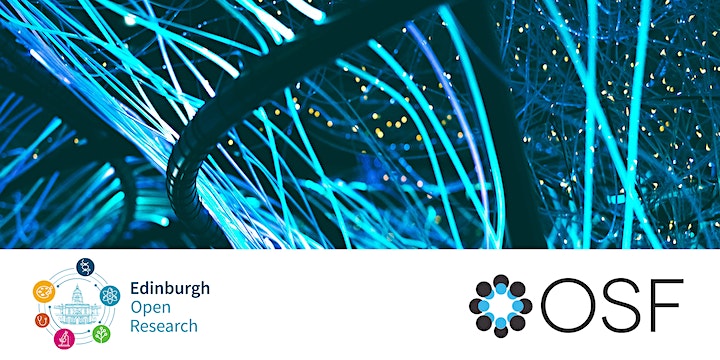
OSF is a free, open platform that provides full integration and sharing across the entire data lifecycle. Among many other things, it streamlines workflows with customisable project organisation and automated version control. It also enhances collaborative research, making it easy to find and connect with other UoE users and their research projects. But wait, there’s more! OSF enables easy management of private and public aspects of a project, so sharing with project teams as well as the wider research community couldn’t be simpler; it’s ideal for sharing preprints and preregistered reports. Best of all, with centralised storage for documents, data, and code, it eliminates the need to scramble around hunting for that one file you need right now: no more trawling through email chains to recover lost data!
To launch the new platform we’ve been running Free Lunch Lunchtime sessions, with Free Lunch in the Main Library. The Centre for Research Collections were kind enough to let us use their rooms on the 6th floor, so obviously, all our attendees used the stairs and worked up a proper appetite for their Free Lunch.
The first event was held on August 30th to a packed house, or room. After the Free Lunch and a bit of professional mingling, Gretchen Gueguen from the Centre for Open Science Zoomed in to give us a brief introduction to and overview of OSF: what it is, how it works, and why it’s such an excellent addition to any research toolbox. Gretchen was followed by Emma Wilson, PhD student, UoE representative for ReproducibiliTea, and Open Research Intern extraordinaire. Emma provided the first of two user-perspectives, talking about her experience of using OSF for her projects, presentations, and posters. The second pair of boots on the ground belonged to Mark Lawson, Data Governance Manager for the Childlight project currently being run out of Moray House School of Education and Sport. Being another long time-user of OSF, as well as being a fan of such tools, Mark spoke with great enthusiasm about the use of OSF to support the data management and project management aspects of his work.
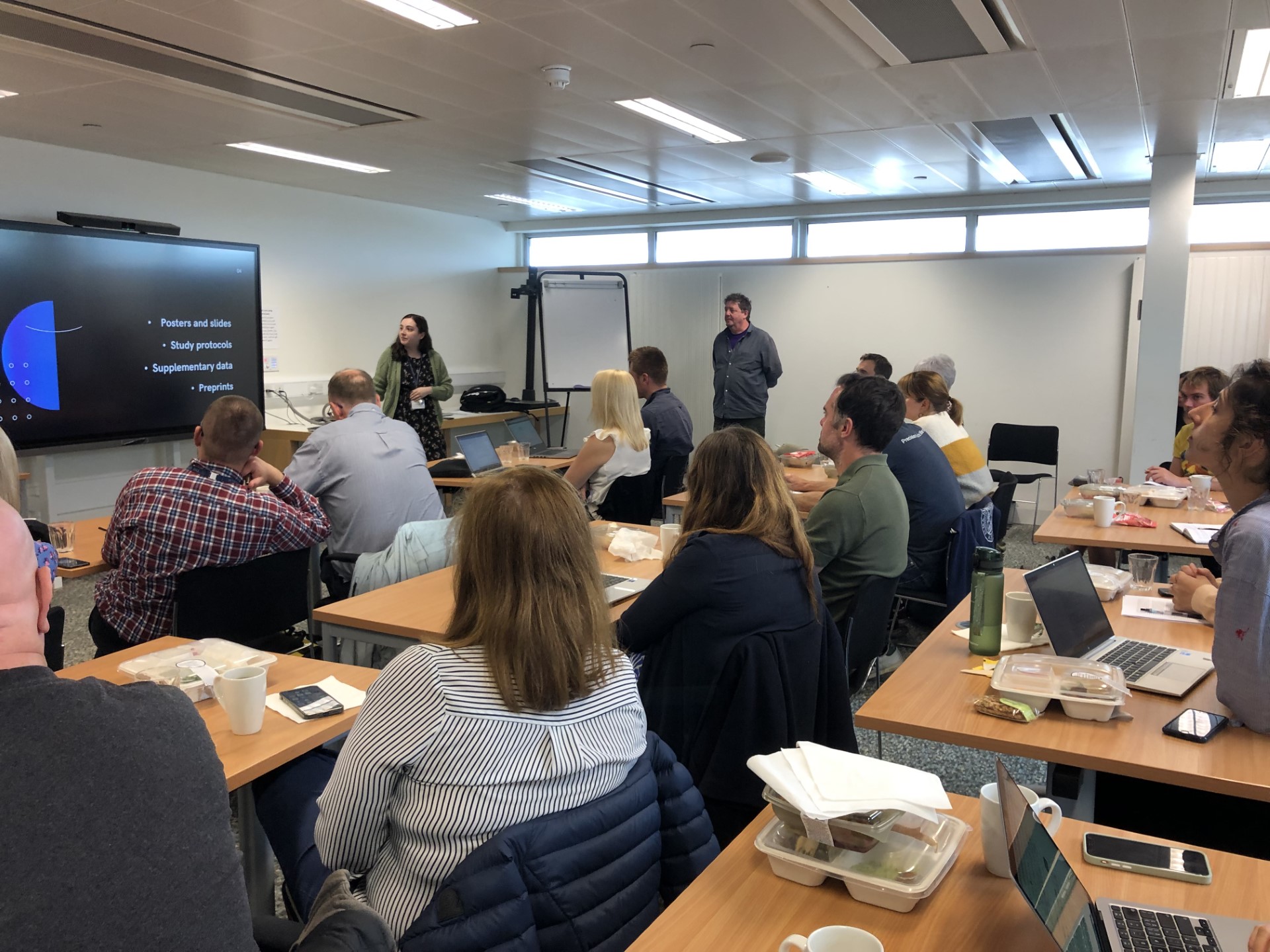
Emma Wilson presenting during the OSF introduction event in August.
The second event wasn’t quite as packed as the first, but it was still nice to see those who managed to make it through the December wind and rain. Once again, Gretchen was there to provide the introduction and overview; and Emma, likewise, returned to talk about her experience as an OSF user. This time, the afternoon was rounded off by Gillian Currie who outlined the OSF training she and Eirini Theofanidou were ready and able to deliver. Before the close of the session Gillian had secured several bookings for her training sessions. Sadly, and despite having organised the event – and the Free Lunch – RDS won’t receive any commission for these bookings.
However, we will soon be in vigorous competition with Gillian and Eirini because we’re preparing to offer OSF Winter and Summer Schools. These sessions will be delivered remotely by COS to an in-person cohort of researchers over two or three days. If all goes to plan, we may even be recording the session recordings for future use. And yes, in case you’re wondering, there will, once again, be a Free lunch for attendees.
To learn more about the University OSF membership go to: https://edin.ac/47aGU0S. Questions about OSF? Email us: data-support@ed.ac.uk.
Dr Simon Smith – Research Data Support Officer
Research Data Support, Library & University Collections
My journey in Edinburgh
Guest blog post by Dr Raj Kumar Bhardwaj, Chief Librarian at St. Stephen’s College – University of Delhi, New Delhi, India.
About myself
I am Dr Raj Kumar Bhardwaj, Chief Librarian at St. Stephen’s College, University of Delhi and Assistant Professor at the Central University of Punjab. I am the author of 65 research papers and have delivered over 100 talks. Throughout my career, I have received a number of awards, such as the Commonwealth Professional Fellowship (UK).
I got an opportunity to avail myself of the two-week fellowship on Research Data Management hosted by the University of Edinburgh. My local mentor was Robin Rice, Data Librarian and Head of Research Data Support of the Information Services.
My experience in Edinburgh
Day #1
In the morning, I met Robin. She provided me with a comprehensive overview of the Research Data Services and introduced me to other team members: Simon, Kerry, Maeve, and Stefano.
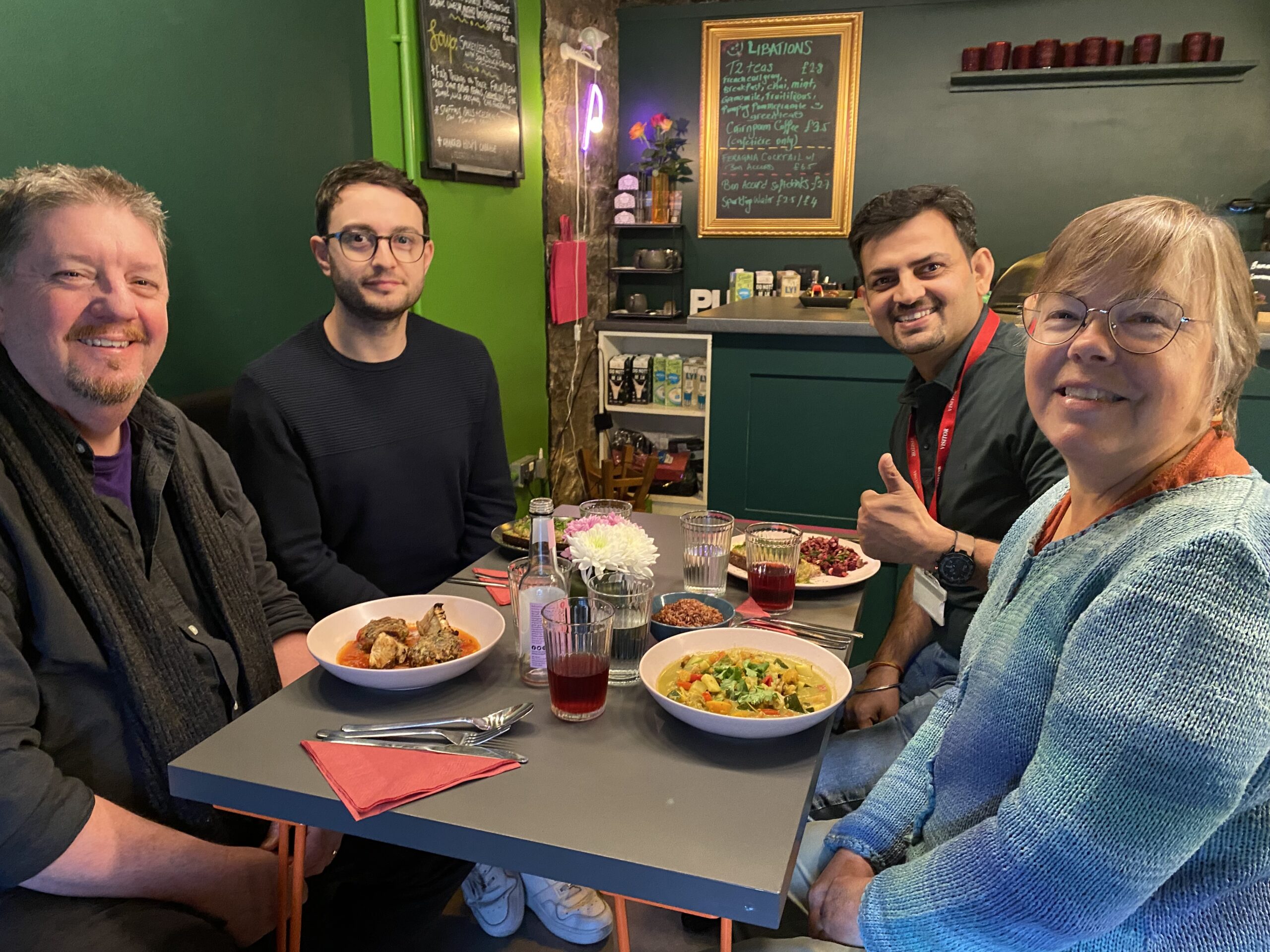
From left: Simon Smith, Stefano Bordoni, Raj Bhardwaj, Robin Rice at Pulse vegan cafe.
On the same day, I had the pleasure of meeting Dr Elizabeth Williams, Head of Library Academic Support, which is a primary link between Colleges and Schools, and the Library.
Later, I met Jeremy Upton, the Director of Library and University Collections. Jeremy shared his insights on the potential use of AI in the library to enhance results. To conclude the meeting, Jeremy took me on a library tour, where I had the opportunity to view the Makerspace section.
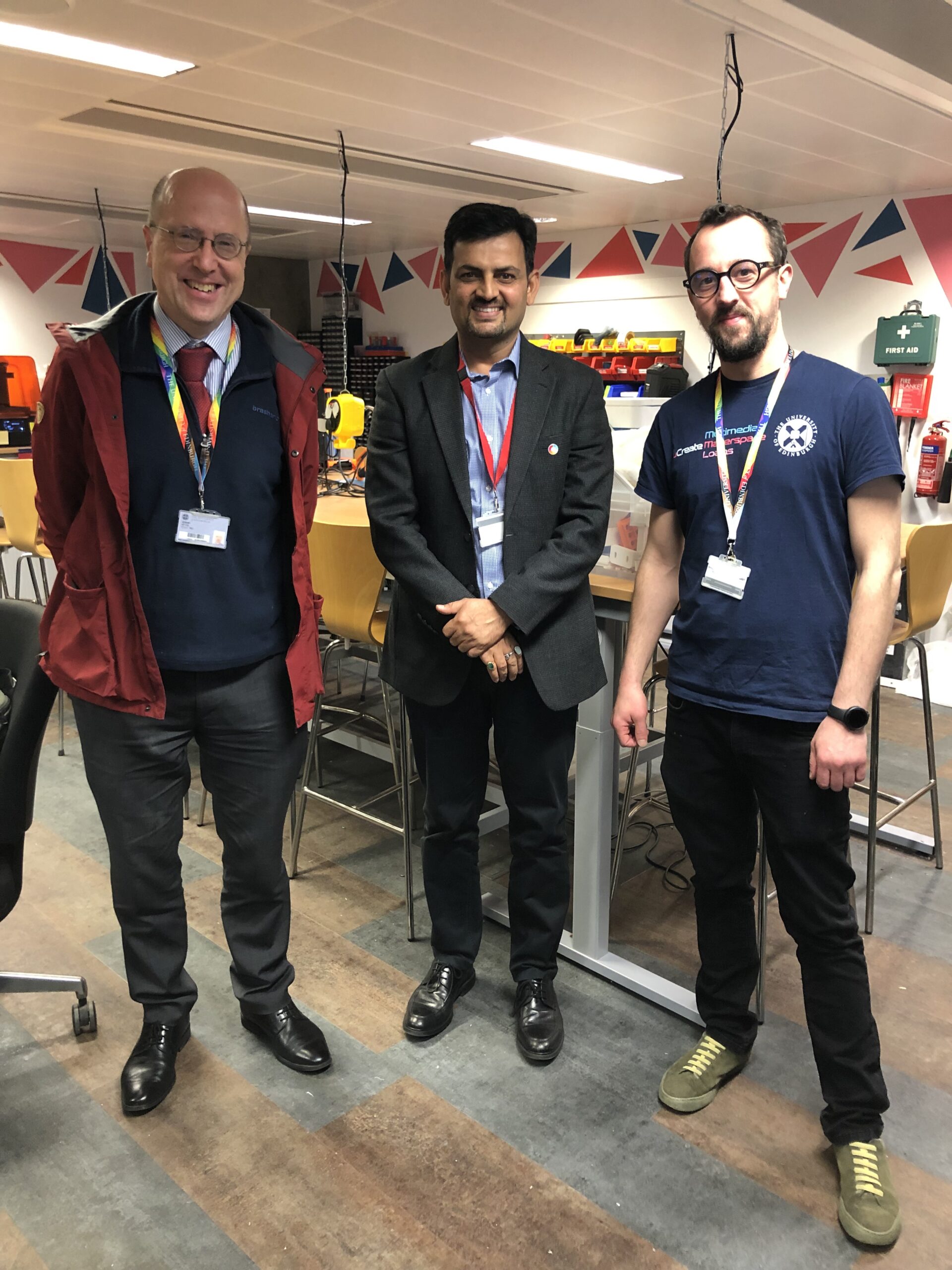
Jeremy Upton, Raj Bhardwaj, Simeon Newbatt (Makerspace Manager).
Day #2
On the 7th of November, I met Dominic Tate, Head of Library Research Support. Dominic explained the structure of the Converged Services in the university, where the library plays a vital role along with IT. We also discussed the roles and responsibilities of his team members in providing research support services.
The same day, I met Maeve McCann, who operates the DataVault facility. She thoroughly explained DataVault’s structure, and the fees applied for data over 100GB.
Later, I attended the workshop on open access publishing organized by Dr Theo Andrew. Theo emphasized the UoE strategies on this topic and showcased systems available to researchers, such as library-supported open access journals.
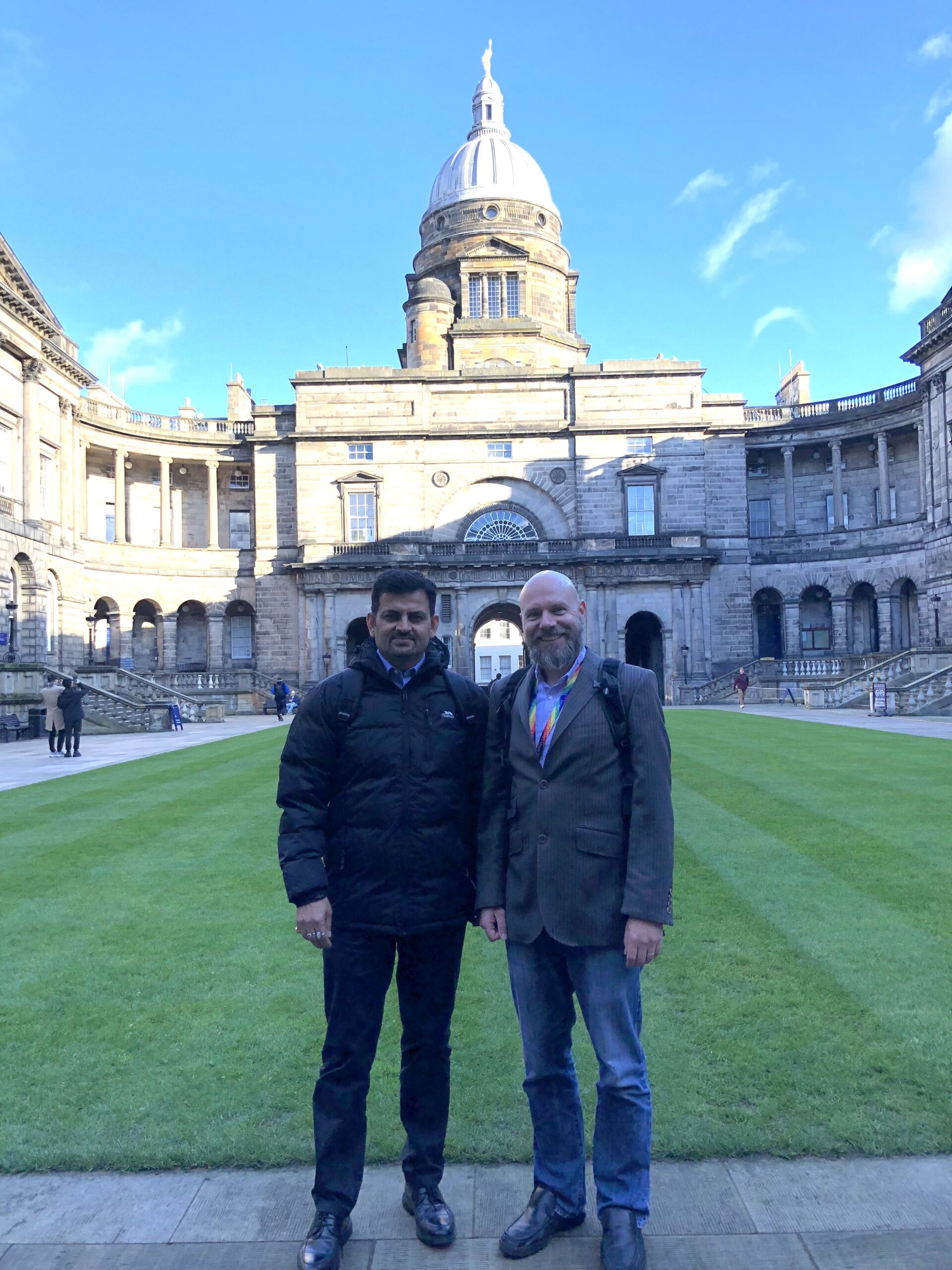
Raj and Theo at Old College
Day #3
The first meeting of the day was organized with Stefano Bordoni, who curates DataShare: the open access data repository of the university. He emphasized the popularity of DataShare among researchers. Stefano demonstrated the overall structure of DataShare.
Later, I met Simon Smith, another member of the RDS team. He explained the Data Management Plan tool, DMPOnline, which help users with their data management. He also delivers training.
Then, I met Sara Thomson, Digital Archivist of the University. Sara explained the significance of digital archiving within the university, especially non-published works. The University of Edinburgh made substantial investments on this.
Later, I met Mary Paulson-Ellis, Royal Literary Fellow who assists researchers 12 slots per week for researchers, including master’s students, on various aspects of academic writing.
The fifth meeting was with Kerry Miller. She promotes several initiatives on the topic of ethics and research integrity, cultural change and citizen science; among them, the Edinburgh Open Research Conference. She also delivers training on those subjects.
The last meeting of the day was with Kevin Ashley, Director of the Digital Curation Centre, who developed the DMPonline tool. He discussed a variety of aspects relating to the start of the National Data Service and discussed data produced under different national legislations.
Day #4
I first met Neil, the Citizen Science Engagement Officer at the University of Edinburgh (UoE). Neil delivers Participatory Science initiatives. They encourage researchers to integrate citizen science into their projects.
The last meeting of the day was with James Reid, the Geospatial Service Manager. Digimap, as a national service, covers multiple datasets, including ordinance data, environmental data, economic data, etc.
Day #5
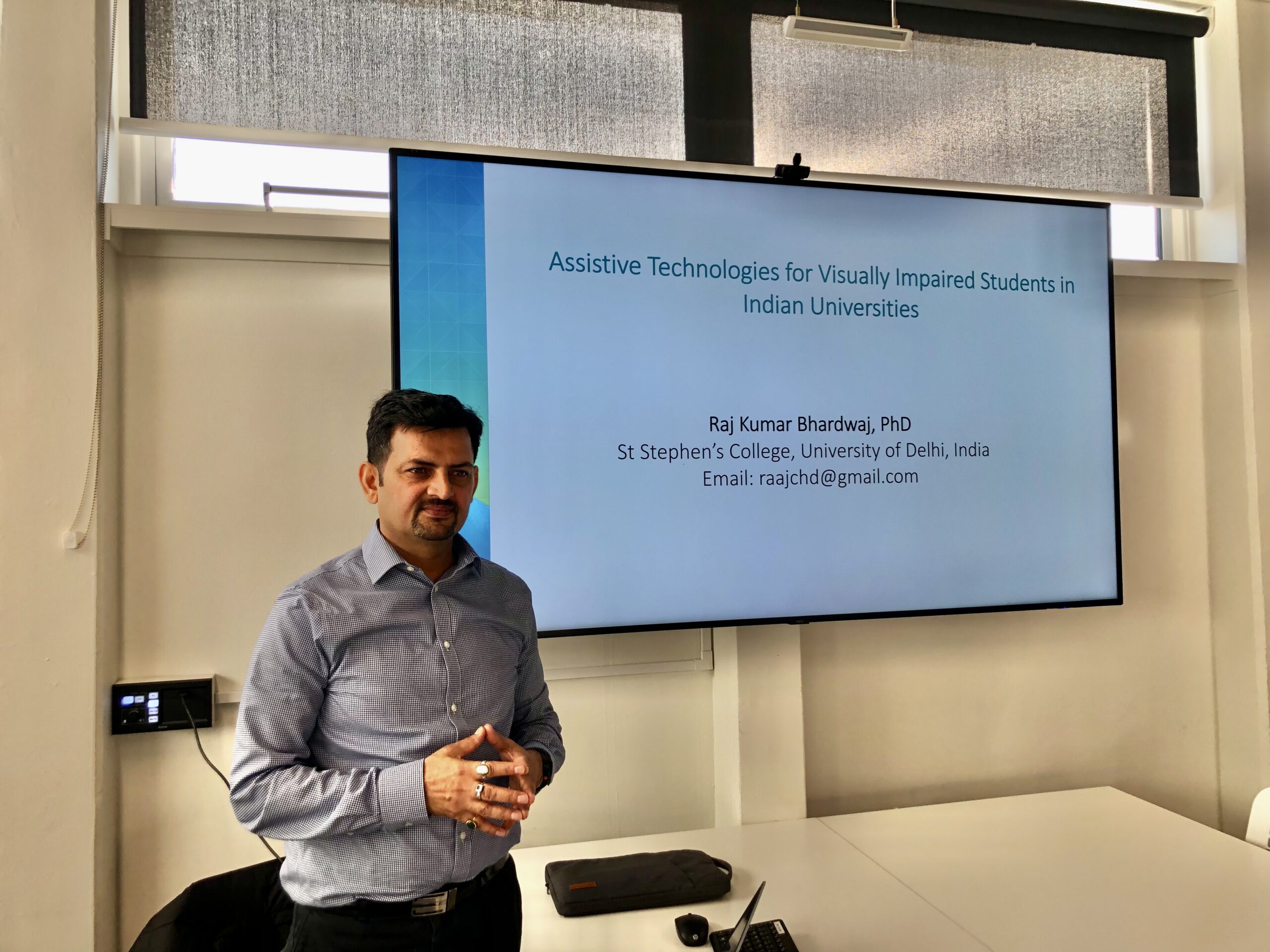
Raj giving his presentation at Napier University.
I delivered a talk at Edinburgh Napier University on “Assistive Technologies for the Visually Impaired in Indian Universities”, where I shared the work I conducted over the last three years. The response was positive, with several attendees and many questions asked.
In the afternoon, I met with Nik Tahirah Nik Hussin, who introduced me to Pure and Worktribe: two services storing research outputs and grant applications records.
I am highly grateful to Robin for this opportunity. I wish to work more with her wonderful team, which she leads graciously. My visit to the University of Edinburgh was full of joy and learning.
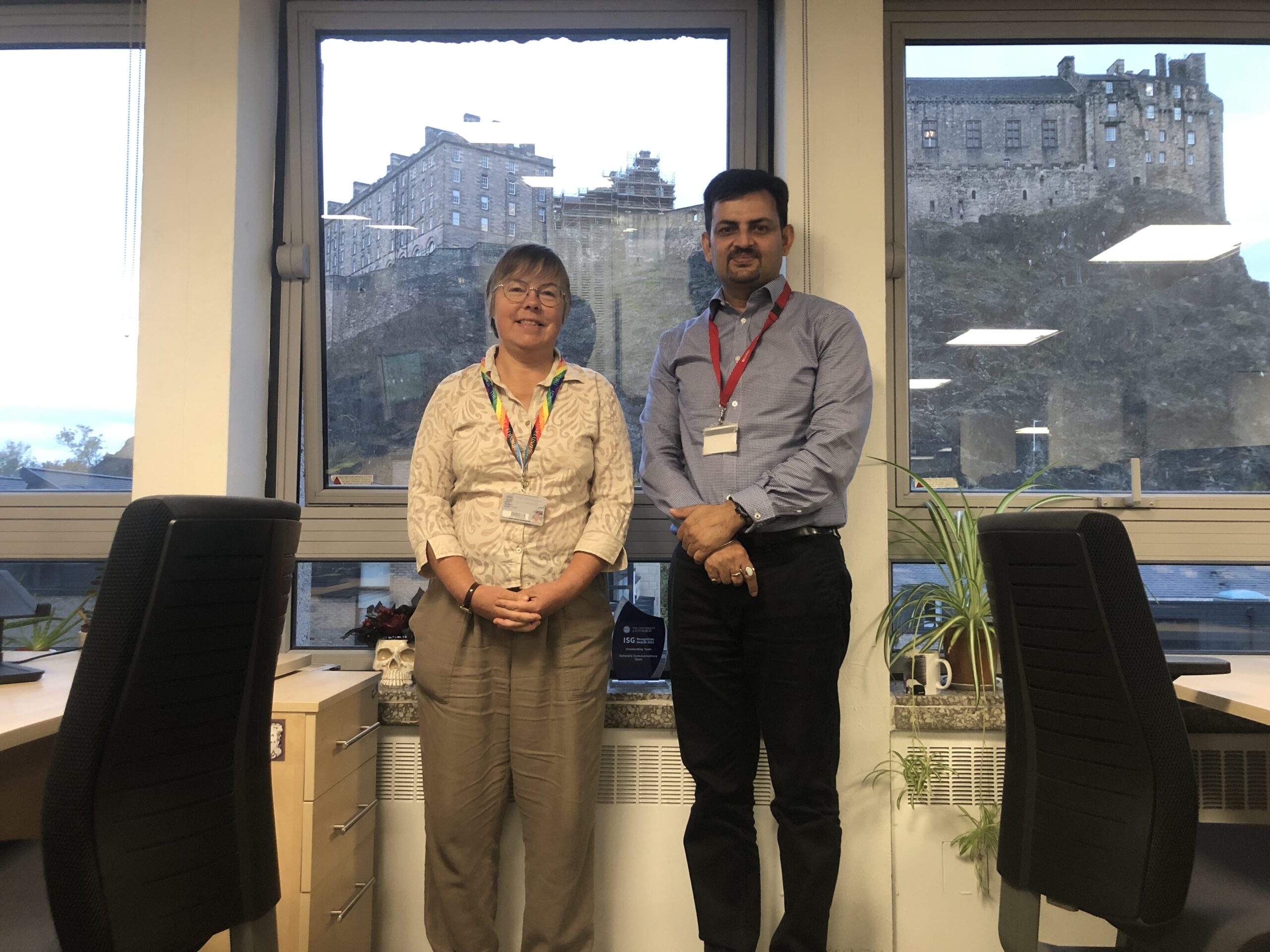
Robin and Raj at the team’s office in Argyle House.
New feature: Sharing DataVault data with an external user
By popular demand, the Research Data Service is pleased to announce the arrival of a brand new feature: the DataVault Outward Staging Area (DOSA), a free-of-charge benefit to DataVault depositors.

What is a staging area? Somewhere your data can be held temporarily, on the way to somewhere else. Just like a traditional staging post for stagecoaches, as shown in this engraving.
Imagine: your multi-terabyte dataset is safe-and-sound in your vault, you’ve cited it in a paper you’ve just published, and an external researcher has asked you for a copy. What will you do?
Simple: send a request to IS Helpline (or data-support@ed.ac.uk) asking us to create a DOSA folder for your data.
We’ll then use DOSA to give temporary (two months) external access to a copy of your deposit, using a Globus FTP endpoint. We’ll retrieve a copy of your data to the folder. And we’ll provide you with the Globus endpoint, which you send to the researcher. They may need to install some software to get the data. Alternatively, for datasets under 500 GB, we suggest a DataSync link will be more suitable. We set that up and provide it to you in the same way as the Globus endpoint. The difference for the end user is they can use the DataSync link (+ password) from their browser. Let us know if you have a preference for a Globus endpoint or a DataSync link (otherwise we’ll decide automatically based on the size).
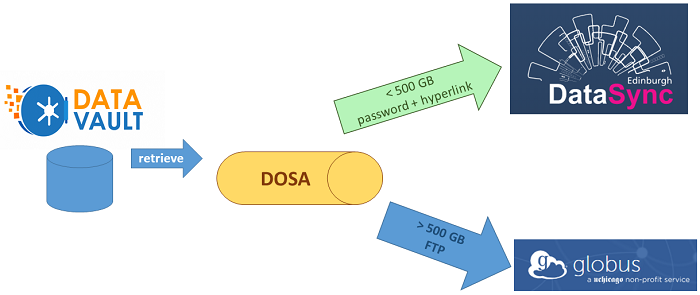
Workflow: We retrieve your deposit to your DOSA folder. We provide you with either a Globus endpoint or a DataSync link, to provide to your external person who made the request.
The DOSA is part of our networked active data storage, DataStore, but separate from the other staging area we provide for users making a new deposit (‘the DataVault staging area’), for the inward route.
Since 2016 researchers have been archiving data in Edinburgh DataVault. The DOSA is available for any DataVault deposit, old or new.
DataVault Outward Staging Area (DOSA): Sharing data with an external user
Not sure you’ll remember the name of the service? Worry not! I have a mnemonic device for you: just remember that a ‘dosa’ is an Indian savoury pancake. What’s not to like?

Pauline Ward
Data Repository Operations Officer
University of Edinburgh
